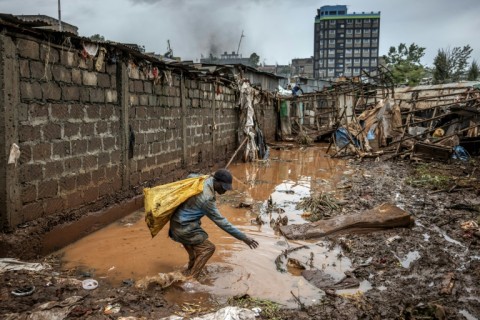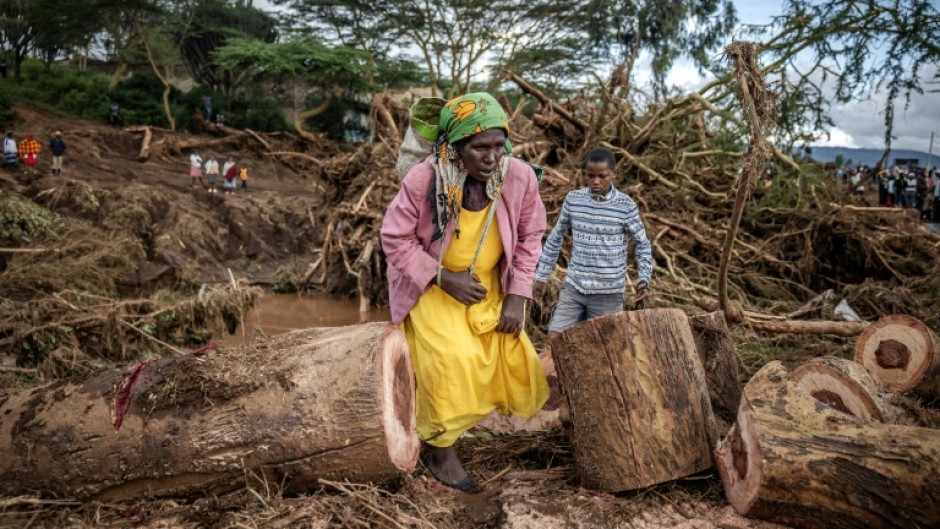The number of people who have lost their lives in devastating floods in Kenya since March has risen to 188, with dozens still missing, the interior ministry said on Thursday.
Torrential rains in Kenya and other countries in East Africa have caused deadly havoc, with floods and landslides forcing people from their homes, destroying roads, bridges and other infrastructure.
"As a result, the country has regrettably recorded 188 fatalities due to severe weather conditions," the ministry said in a statement.
It added that 125 people had been reported injured and 90 people were currently missing, while 165,000 have been displaced.
On Wednesday, nearly 100 tourists were among people marooned after a river overflowed in Kenya's famed Maasai Mara wildlife reserve following a heavy downpour.
The ministry said rescuers had successfully evacuated 90 people by ground and air in the Masai Mara, where lodges and safari camps were flooded after the River Talek overflowed.
- Risk of waterborne diseases -
The area is currently inaccessible with bridges washed away, Narok West sub-county administrator Stephen Nakola told AFP, adding that about 50 camps in the reserve have been affected, putting more than 500 locals temporarily out of work.
There are no fatalities but communities living around the area have been forced to move away.

"Accessing the Mara is now a nightmare and the people stuck there are really worried, they don't have an exit route," Nakola said,
adding that waterborne diseases were likely to emerge.
"I am worried that the situation could get worse because the rains are still on."
In the deadliest single incident in Kenya, dozens of villagers were killed when a dam burst on Monday near Mai Mahiu in the Rift Valley, about 60 kilometres (40 miles) north of the capital, Nairobi.
The interior ministry said 52 bodies had been recovered and 51 people were still missing after the dam disaster.
- 'Marginalised communities at risk' -
Kenyan President William Ruto on Tuesday announced he was deploying the military to evacuate everyone living in flood-prone areas.
Opposition politicians and lobby groups have accused Ruto's government of being unprepared and slow to respond to the crisis despite weather warnings, demanding that it declare the floods a national disaster.
"Kenya's government has a human rights obligation to prevent foreseeable harm from climate change and extreme weather events and to protect people when a disaster strikes," Human Rights Watch said Thursday.
The HRW statement said events such as flooding are "particularly threatening for marginalised and at-risk populations, including older people, people with disabilities, people in poverty, and rural populations".
The United States and Britain have issued travel warnings for Kenya, urging their nationals to be cautious amid the extreme weather.
The downpours have also left a trail of destruction across other East African countries, including neighbouring Tanzania, where at least 155 people have been killed in flooding and landslides.
The heavy seasonal rains have been amplified by the El Nino weather pattern -- a naturally occurring climate phenomenon typically associated with increased heat worldwide, leading to drought in some parts of the world and heavy rains elsewhere.
The disaster in Kenya and other nations has sparked an outpouring of condolences and pledges of solidarity with the affected families from all over the world.
UN Secretary General Antonio Guterres is "deeply distressed" to hear of the loss of lives from heavy flooding in Burundi, Kenya, Somalia and Tanzania and other parts of East Africa, his spokesman Stephane Dujarric said.
"The (UN) secretary-general is extremely concerned about the impacts of El Nino-triggered extreme weather, which risk further devastating communities and undermining their livelihoods."

